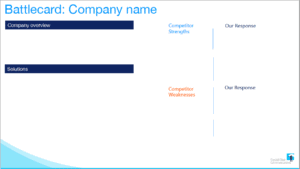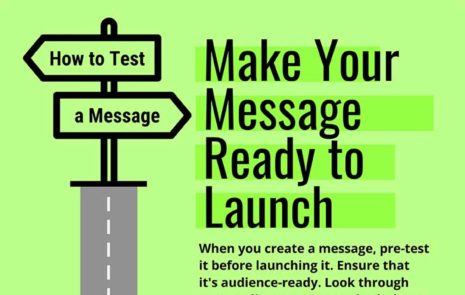
How to market successfully against competitors
Market successfully against competitors.
One of our clients recently came under attack by its closest competitor. This competitor placed untrue claims about our client on a third-party website. So our client had to quickly figure out if and how to respond.
While this is an extreme, hopefully rare situation, many clients ask how best to market against competitors. Particularly those that use more aggressive marketing tactics.
Often, even without naming you, competitors position themselves strongly in areas where your product or service may be weaker. How do you respond?
Here are 4 tips to market successfully against competitors:
- Make a color-coded Message Map.
- Create competitive battle cards.
- Arm your sales force with objection handlers.
- Deliver content your buyers want.
Make a color-coded Message Map
If you don’t already have a Message Map for your company, product or service, make one. The best messages highlight your differentiators:
What do you do or have that your competitors don’t, and exactly how do you outperform competitors?
Use a different-colored font or type style for your differentiators. And ensure everyone who uses the Message Map understands what that color or type means. As you create marketing content, ensure that it includes differentiators to help lead buyers to choose your brand.
Create competitive battle cards
A battle card contains all the key facts about a competitor on one page, including their top 3 strengths and weaknesses, along with how to respond. They make it easier for your salesforce to learn how to pitch your strengths and talk about areas where your brand might be weaker. You can download our free battle card template here.

Arm your salesforce with objection handlers
While battle cards are a great tool for your salesforce, since they list only the top 3 strengths of each competitor, sometimes they aren’t granular enough. If your competitors are attacking your brand or product in the market, you may need to go one level deeper.
Talk to your most loyal clients. Find out why they stick with you and what they think about your competitors.
Talk to your salesforce. Find out what questions buyers ask about your competitors.
Use the information you gather to arm your salesforce with objection handlers. Objection handlers help salespeople respond to specific questions about competitors.
So the next time a buyer says, “But your competitor told me you don’t do X,” your salesperson can respond with confidence.
It also helps to train your sales team on an objection handling framework.
Deliver content your buyers want to market successfully against competitors
Avoid focusing so much on marketing your differentiators that you fail to deliver the relevant content that buyers want and need to make a decision.
Review your buyer personas and map your content to the buyer journey. With those insights, you can deliver a healthy mix of marketing content that emphasizes your strengths and provides buyers the personalized content they want.
Should you counter-attack competitors who name your brand or product?
If a competitor directly attacks your brand or product, it can be tempting respond in the same manner. Before you do, stop and answer these questions:
- Is what the competitor’s marketing stated true? If not, you may need to involve your legal department and send a cease-and-desist notice. If so, and you don’t have a good, factual response, it may not be worth responding via marketing channels. Instead, arm your salesforce with responses in the event buyers ask about what they saw from your competitor.
- How many people likely saw the competitor’s marketing? Did the competitor post something on their own website that may not have been seen by many, or did they do a full marketing campaign? Don’t help competitors inadvertently by starting a fight that draws attention to their claim.
- Is responding in the same manner in line with your brand’s personality? While it may be frustrating to see your competitor’s marketing materials, don’t respond if it’s off-brand for your company. If you do, you risk confusing clients and turning buyers off of your brand.
Unless your competitor is spreading falsehoods about your brand, it’s often better to stay above the fray and win over the long term by focusing on your brand’s strengths.
Regardless of whether you choose to respond publicly, always arm your salesforce with clear, factual statements they can use when responding to buyer questions.
While it’s frustrating when competitor marketing targets your brand, you will stand out and win buyers over with clear, differentiated content they want and need.
For more tips on messaging, communications, and marketing strategy or marketing plan, subscribe to our weekly blog.
Related Posts
Top 100 Content Marketing Question: What are the most effective ways to Tweet content?
The most effective ways to Tweet are demonstrated daily How great is the power of Twitter to break news, spark dialogue and incite debate? When the...
“How do you convey something very complex in content marketing?”
How to make complex content simple Marketers who work in technology, finance, health care, and science-related fields face a common challenge: how to communicate...
Test Your Message Before Launch: Make It Clear, Compelling, Consistent & Concise
Is your new message ready for launch? Look through the eyes of your audience to make sure your message passes the 4-Cs test: It’s...
“How can a Google Ads campaign work best to convert responders?”
A marketer from SEI Investments Company asked, “How can an AdWords (now called Google Ads) campaign work best to convert responders?” It’s among the...





